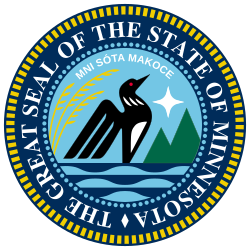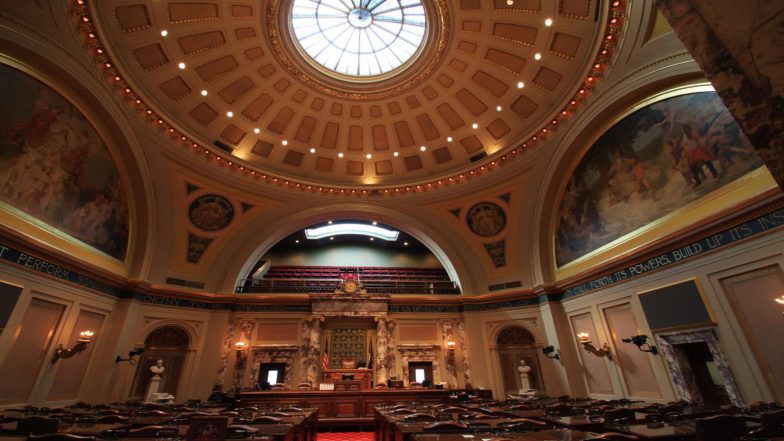Summary
The Minnesota Senate is the upper house of the Legislature of the U.S. state of Minnesota. At 67 members, half as many as the Minnesota House of Representatives, it is the largest upper house of any U.S. state legislature. Floor sessions are held in the west wing of the State Capitol in Saint Paul. Committee hearings, as well as offices for senators and staff, are located north of the State Capitol in the Minnesota Senate Building. Each member of the Minnesota Senate represents approximately 80,000 constituents.
OnAir Post: Minnesota State Senate
Wikipedia
Contents
The Minnesota Senate is the upper house of the legislature of the U.S. state of Minnesota. At 67 members, half as many as the Minnesota House of Representatives, it is the largest upper house of any U.S. state legislature.[2] Floor sessions are held in the west wing of the State Capitol in Saint Paul. Committee hearings, as well as offices for senators and staff, are located north of the State Capitol in the Minnesota Senate Building. Each member of the Minnesota Senate represents approximately 85,000 constituents.[3]
History
The Minnesota Senate held its first regular session on December 2, 1857.[4]
Powers
In addition to its legislative powers, certain appointments by the governor are subject to the Senate's advice and consent. As state law provides for hundreds of executive appointments, the vast majority of appointees serve without being confirmed by the Senate; only in rare instances does the Senate reject appointees.[5] It has rejected only nine executive appointments since 2000.[6]
Elections
Each Senate district is split between an A and B House district (e.g., Senate District 41 contains House districts 41A and 41B). The Minnesota Constitution forbids House districts that are within more than one Senate district.[7]
To account for decennial redistricting, members run for one two-year term and two four-year terms each decade. Senators are elected to four-year terms in years ending in 2 and 6, and to two-year terms in years ending in 0.[8] Districts are redrawn after the decennial United States Census in time for the primary and general elections in years ending in 2. The most recent election was held on November 8, 2022.
Leadership
From statehood through 1972, the lieutenant governor served as president of the Senate. In 1972, voters approved a constitutional amendment that provided for the Senate to elect its own president beginning January 1973.[9] The president, who presides over official Senate proceedings, also acts as the parliamentarian and oversees the secretary of the senate.[10] The majority leader is responsible for managing and scheduling the business of the Senate and oversees partisan and nonpartisan staff. The current majority leader is Erin Murphy, a Democrat from Saint Paul.[11] The current minority leader is Mark Johnson, a Republican from East Grand Forks.[12] Each caucus also selects its own leaders and deputy leaders.
Minnesota Senate Building
Committee hearings mostly take place in the Minnesota Senate Building, a 293,000-square-foot (27,200 m2) office building that opened in January 2016.[13] The $90 million office building, which is north of the State Capitol across University Avenue, includes three committee hearing rooms, offices for all senators and staff, a raised terrace overlooking the State Capitol, and a 264-space underground parking facility.[14]
The 2016 session was held in the newly constructed Minnesota Senate Building due to an extensive restoration at the State Capitol. It was the first time the Senate held a regular session outside the Capitol since it opened in 1905.[15]
Composition
Historical composition
| Years | Party[16] (Shading indicates majority caucus) | Total | |||
|---|---|---|---|---|---|
| Democratic– Farmer–Labor | Republican | Independent | Vacant | ||
| 2001–2003 | 41 | 25 | 0 | 0 | 67 |
| 2003–2007 | 35 | 31 | 0 | 0 | 67 |
| 2007–2011 | 44 | 23 | 0 | 0 | 67 |
| 2011–2013 | 30 | 37 | 0 | 0 | 67 |
| 2013–2017 | 39 | 28 | 0 | 0 | 67 |
| 2017-2021 | 33 | 34 | 0 | 0 | 67 |
| 2021–2023 | 31 | 34 | 2[nb 1] | 0 | 67 |
| 2023–2027 | 34 | 33 | 0 | 0 | 67 |
Current composition
- 94th Minnesota Legislature (2025-2027)
| Party (Shading indicates majority caucus) | Total | Vacant | |||
|---|---|---|---|---|---|
| Republican | Ind | Democratic– Farmer–Labor | |||
| End of the previous Legislature | 34 | 1[nb 1] | 31 | 66 | 1 |
| Begin 2023 | 33 | 0 | 34 | 67 | 0 |
| December 27, 2024[nb 2] | 33 | 66 | 1 | ||
| February 3, 2025[nb 3] | 34 | 67 | 0 | ||
| March 20, 2025[nb 4] | 32 | 66 | 1 | ||
| May 6, 2025[nb 5] | 33 | 67 | 0 | ||
| July 21, 2025[nb 6] | 32 | 66 | 1 | ||
| July 25, 2025[nb 7] | 33 | 65 | 2 | ||
| November 18, 2025[nb 8] | 33 | 34 | 67 | 0 | |
| Latest voting share | 49.3% | 50.7% | |||
Current members

 |
|---|
| Constitution |
Committees
| Committee | Chair | Vice Chair | Ranking Minority Member |
|---|---|---|---|
| Agriculture, Veterans, Broadband, and Rural Development | Aric Putnam | Rob Kupec | Torrey Westrom |
| Agriculture, Veterans, Broadband, and Rural Development - Subcommittee on Veterans Committee | Aric Putnam | None | None |
| Capital Investment | Sandy Pappas | Susan Pha | Karin Housley |
| Commerce and Consumer Protection | Matt Klein | Judy Seeberger | Gary Dahms |
| Education Finance | Mary Kunesh | Heather Gustafson | Jason Rarick |
| Education Policy | Steve Cwodzinski | Erin Maye Quade | Julia Coleman |
| Elections | Jim Carlson | Bonnie Westlin | Mark Koran |
| Energy, Utilities, Environment, and Climate | Nick Frentz | Tou Xiong | Andrew Mathews |
| Environment, Climate, and Legacy | Foung Hawj | Jen McEwen | Steve Green |
| Finance | John Marty | Nick Frentz | Eric Pratt |
| Health and Human Services | Melissa Wiklund | Alice Mann | Paul Utke |
| Higher Education | Omar Fateh | Aric Putnam | Zach Duckworth |
| Housing and Homelessness Prevention | Lindsey Port | Liz Boldon | Eric Lucero |
| Human Services | John Hoffman | Omar Fateh | Jordan Rasmusson |
| Jobs and Economic Development | Bobby Joe Champion | Zaynab Mohamed | Rich Draheim |
| Judiciary and Public Safety | Ron Latz | Clare Oumou Verbeten | Warren Limmer |
| Labor | Jen McEwen | Grant Hauschild | Gene Dornink |
| Rules and Administration | Erin Murphy | Ann Rest | Mark Johnson |
| State and Local Government | Tou Xiong | Heather Gustafson, Erin Maye Quade | Andrew Lang |
| Taxes | Ann Rest | Matt Klein | Bill Weber |
| Transportation | Scott Dibble | Ann Johnson Stewart | John Jasinski |
See also
- Minnesota House of Representatives
- Minnesota Legislature
- Past composition of the Senate
- List of Minnesota state legislatures
Notes
- ^ a b Caucused with Republicans
- ^ Democrat Kari Dziedzic (District 60) died.
- ^ Democrat Doron Clark seated to succeed Dziedzic.[17] Elected in a special election on January 28, 2025.
- ^ Republican Justin Eichorn (District 6) resigned on March 20, 2025, after being arrested during a sting operation on suspicion of soliciting a minor for sex.[18]
- ^ Republican Keri Heintzeman sworn in to succeed Eichorn.[19]
- ^ Republican Bruce Anderson (District 29) died.[20]
- ^ Democrat Nicole Mitchell (District 47) resigned after being convicted of felony burglary charges.[21]
- ^ Republican Michael Holmstrom Jr. and Democrat Amanda Hemmingsen-Jaeger were sworn in to succeed Anderson and Mitchell, respectively.[22]
- ^ a b c d e f g h i Elected in a special election.
References
- ^ "Frequently Asked Questions - Representatives and Senators - Minnesota Legislature".
- ^ Legislatures, National Conference of State. "Number of Legislators and Length of Terms in Years". www.ncsl.org. Retrieved January 8, 2025.
- ^ "Frequently Asked Questions - - Minnesota Legislature". www.leg.state.mn.us. Retrieved September 28, 2019.
- ^ "Sessions of the Minnesota State Legislature and the Minnesota Territorial Legislature, 1849-present". Minnesota Legislative Reference Library. Retrieved October 19, 2019.
- ^ "Creation and Organization of Executive Branch Agencies". Minnesota House of Representatives Research Department. Retrieved February 27, 2014.
- ^ "Senate Confirmations: Problematic Governor Appointments - Minnesota Legislative Reference Library". www.leg.state.mn.us. Retrieved October 19, 2019.
- ^ "Minn. Const. art. IV, § 3". Constitution of the State of Minnesota. Retrieved January 24, 2013.
- ^ "Minn. Const. art. IV, § 4". Constitution of the State of Minnesota. Retrieved January 24, 2013.
- ^ "President and President Pro Tempore of the Minnesota Senate, 1849-present". Minnesota Legislative Reference Library. Retrieved January 24, 2013.
- ^ "Minnesota Senate President and President Pro Tempore, 1849-present - Minnesota Legislative Reference Library". www.leg.state.mn.us. Retrieved October 19, 2019.
- ^ "Majority and Minority Leaders of the Minnesota Senate, 1933-present". Minnesota Legislative Reference Library. Retrieved September 10, 2021.
- ^ "Senate Member Information 2021 - 2022". Minnesota Legislature. Retrieved September 16, 2021.
- ^ Davis, Don (January 11, 2016). "Minnesota Senate Building quietly opens in spite of disagree..." Forum News Service. Retrieved November 21, 2017.
- ^ "After controversy, new Minnesota Senate Office Building finally opens". Twin Cities. January 11, 2016. Retrieved November 23, 2017.
- ^ Stassen-Berger, Rachel E. (August 6, 2017). "How the newly restored Minnesota Capitol came to be". St. Paul Pioneer Press. Retrieved October 19, 2019.
- ^ "Party Control of the Minnesota Senate". Minnesota Legislative Reference Library. Retrieved December 30, 2022.
- ^ Hauser, Tom; Brown, Kyle (February 3, 2025). "Doron Clark is sworn in to Senate, restoring DFL's one-seat majority". KSTP-TV. Retrieved February 4, 2025.
- ^ LeSavage, Briggs (March 20, 2025). "Sen. Eichorn submits letter of resignation following prostitution of a minor charge". KBJR-TV. Retrieved March 20, 2025.
- ^ "Keri Heintzeman Sworn in as State Senator for District 6". Lakeland PBS. Lakeland News. Retrieved May 7, 2025.
- ^ MPR News Staff (July 21, 2025). "'A a dedicated public servant': Republican state Senator Bruce Anderson dies at 75". Minnesota Public Radio.
- ^ Minor, Nathaniel (July 25, 2025). "Nicole Mitchell resigns seat in the Minnesota Senate". Minnesota Star Tribune.
- ^ Cummings, Caroline (November 18, 2025). "Minnesota Senate returns to full strength with Holmstrom, Hemmingsen-Jaeger sworn in". CBS News.
- ^ "Minnesota Senate Committees". Minnesota Legislature. 2025. Retrieved April 15, 2025.


